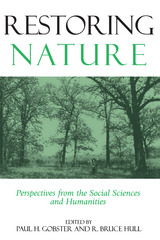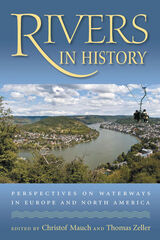3 start with R start with R


Ecological restoration is an inherently challenging endeavor. Not only is its underlying science still developing, but the concept itself raises complex questions about nature, culture, and the role of humans in the landscape.
Using a recent controversy over ecological restoration efforts in Chicago as a touchstone for discussion, Restoring Nature explores the difficult questions that arise during the planning and implementation of restoration projects in urban and wildland settings. Contributors examine:
- moral and ethical questions regarding the practice of restoration
- conflicts over how nature is defined and who should be included in decisions about restoration and management
- how managers can make restoration projects succeed given the various constraints and considerations that need to be taken into account
Using diverse examples from projects across the U.S., the book suggests ways in which restoration conflicts might be resolved, and provides examples of stewardship that show how volunteers and local residents can help make and maintain restored environments. Throughout, contributors set forth a wealth of ideas, case studies, methodological approaches, and disciplinary perspectives that shed valuable light on the social underpinnings of ecological restoration and natural resource management.
Restoring Nature is an intriguing exploration of human-nature interactions, of differing values and understanding of nature, and of how that information can be effectively used to guide science and policy. It provides new conceptual insights and practical solutions for anyone working to manage or restore natural ecosystems.

Rivers in History presents one of the first comparative histories of rivers on the continents of Europe and North America in the modern age. The contributors examine the impact of rivers on humans and, conversely, the impact of humans on rivers. They view this dynamic relationship through political, cultural, industrial, social, and ecological perspectives in national and transnational settings.
As integral sources of food and water, local and international transportation, recreation, and aesthetic beauty, rivers have dictated where cities have risen, and in times of flooding, drought, and war, where they've fallen. Modern Western civilizations have sought to control rivers by channeling them for irrigation, raising and lowering them in canal systems, and damming them for power generation.
Contributors analyze the regional, national, and international politicization of rivers, the use and treatment of waterways in urban versus rural environments, and the increasing role of international commissions in ecological and commercial legislation for the protection of river resources. Case studies include the Seine in Paris, the Mississippi, the Volga, the Rhine, and the rivers of Pittsburgh. Rivers in History is a broad environmental history of waterways that makes a major contribution to the study, preservation, and continued sustainability of rivers as vital lifelines of Western culture.
READERS
Browse our collection.
PUBLISHERS
See BiblioVault's publisher services.
STUDENT SERVICES
Files for college accessibility offices.
UChicago Accessibility Resources
home | accessibility | search | about | contact us
BiblioVault ® 2001 - 2024
The University of Chicago Press









